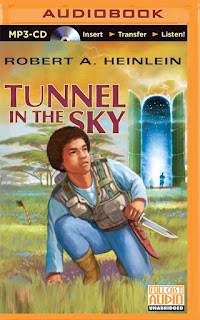Tunnel in the Sky
 Tunnel in the Sky, by Robert A. Heinlein
Tunnel in the Sky, by Robert A. HeinleinRod Walker, high school student, has been taking a higher-level class in advanced survival. His ambition is to someday see the other worlds humanity is colonizing, and survival skills are of the first importance. The final exam is a field test; Rod and his classmates will be dropped on an unknown planet for anywhere from two to ten days. They can take whatever equipment they wish. Rod is surprised to find himself alone on the other end of the gate -- they've dropped the students far apart instead of in a group -- and he does all right for the first couple of days. But the exit gate never opens, and Rod and his classmates have to build a surviving society of their own, without knowing if anyone will ever come to get them.
 This was a great read! My 16-year-old daughter loved it too, and says it was what she hoped Lord of the Flies would be, before she read it and was disappointed. (She really likes survival stories, and as a kid informed me that Robinson Crusoe was a big cheater, taking all that stuff off the wrecked ship.) It's a great story, with strong characters -- including a good few women. The first half is focused on the survival stuff, and the second half on building a working society from scratch.
This was a great read! My 16-year-old daughter loved it too, and says it was what she hoped Lord of the Flies would be, before she read it and was disappointed. (She really likes survival stories, and as a kid informed me that Robinson Crusoe was a big cheater, taking all that stuff off the wrecked ship.) It's a great story, with strong characters -- including a good few women. The first half is focused on the survival stuff, and the second half on building a working society from scratch. Now, the setup is a very Malthusian future, so there is a massive population of humans but no more food than before. Thus, thanks to a handy gate technology, people are constantly emigrating to new, empty planets, and Earth people live mostly underground, leaving the topsoil for wilderness and farming. It's kind of funny to see Heinlein insisting that everybody in an overcrowded future will still have six children each (when now, world fertility rates have plummeted, so that we will have a future full of old people and relatively few youngsters) and that you can't grow more food on the same amount of land (in fact, we now grow more food on less land, allowing for reforestation in some places).
Anyway, it was all very fun; this is a good pick if you're looking to read a Heinlein title. I read it in a three-pack called Infinite Possibilities, but it's available on its own too.
 |
| German edition, featuring a wagon train to the stars! |




a classic Heinlein; i enjoyed it immensely, long ago...
ReplyDeleteOh yay! This is a different review than what I expected! I have been hearing about horrible classic sci-fi lately with lots of sexism and racism and other terriblenesses, and I was braced for you to say something similar about this. But yay! I will try it!
ReplyDeleteIt can be hit or miss, but classic SF is by no means uniformly terrible. Heinlein has his moments of cardboard stereoypical girl characters -- Puppet Masters, for example -- but most of the Heinlein stories I have read have had interesting women and multi-racial casts. He was certainly better at character stuff than Asimov! Heinlein titles you might be able to deal with to start: this one, Have Spacesuit Will Travel, Moon is a Harsh Mistress. He likes to fool around with math and different kinds of societies.
ReplyDelete